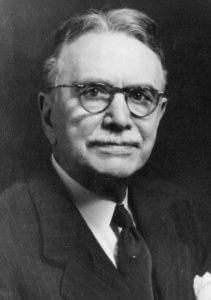Mission Bishop and Founder of Relief Agency

Herbert Welch (1862-1969), the longest serving Methodist bishop, played multiple roles of lasting significance in the mission and social history of the church. His accomplishments included:
- Originator and first executive (1940 to 1948) of what is today the United Methodist Committee on Relief, the disaster response and development agency of the denomination,
- An organizer of the Methodist Federation for Social Service (1907), within whose work lie the roots of the Methodist Social Creed, one of the first church endorsements of fair labor laws and labor organizing,
- Mission bishop of the Methodist Episcopal Church for Japan and Korea from 1916-1928,
- Participant in the formation of the popular Affirmation of Faith known as “The Korean Creed.”
Welch was born on November 7, 1862, in New York City. Educated at Wesleyan University in Connecticut, Drew Theological Seminary in New Jersey, and Oxford University in England, he was ordained deacon by the New York Annual Conference of the Methodist Episcopal Church in 1892 and elder in 1894. He and his wife, Adelaide Frances McGee (they married in 1890), would have two daughters. After pastoral service in his conference, Welch was elected President of Ohio Wesleyan University in 1905.
While at the college, he and four other Methodist clergymen organized the Methodist Federation for Social Service (today, Methodist Federation for Social Action), and he served as its first president. The Methodist Social Creed, of which Welch as a primary author, became the model for Methodist and Protestant ecumenical statements of support for labor organizing and opposition to child labor, setting a precedent for churches taking stands on social issues. The Methodist Social Creed influenced a similar statement by the Federal Council of Churches as well as US government labor policy under President Theodore Roosevelt.
Welch was elected to the episcopacy in 1916 and assigned to the Japan and Korea area, where he served until 1928. While in Asia, Welch contributed to the formation of the Affirmation of Faith called “The Korean Creed,” which would become one of the affirmations used in Methodist worship around the world.
Welch served the Pittsburgh Episcopal Area from 1928 to 1932, when he was reassigned for four years to Asia, notably to the Shanghai Area in China. He retired in 1936. He would be called out of retirement to preside over the Boston Episcopal Area from 1938 to 1940. His experience and contacts in China prepared him for his role in forming what was initially named the Methodist Committee for Overseas Relief (MCOR). The agency was created by the 1940 General Conference in response to a proposal presented by the Methodist Committee for China Relief by Bishop Welch, the committee chair, then 78 and already twice retired. He would serve for another eight years as the director of MCOR, which took as its motto:
Giving by Christians for the needy, without distinction for race, creed, or color.
“We bear witness to Christ by serving all in the name of Christ,” said the bishop, who raised $8 million during his tenure at MCOR, initially for war refugees in Asia, for Europe after World War II, for Palestine after 1947, and then internationally. In 1942, a proposal from MCOR to the board of directors would recognize that war relief would have to be more than just providing necessities to refugees and displaced populations. In addition to relief, the proposal suggested that MCOR should be involved in reconstruction, rehabilitation, repatriation of refugees and prisoners of war, restoration of churches and civil operations, and reconciliation—an effort to restore peace and goodwill.
Herbert Welch died in New York City at the age of 106.
Narrative by Elliott Wright, from information drawn from:
- Website of the General Commission on Archives and History
- New World Outlook Magazine
- The Christian Advocate, Google Books
- Herbert Welch Obituary




